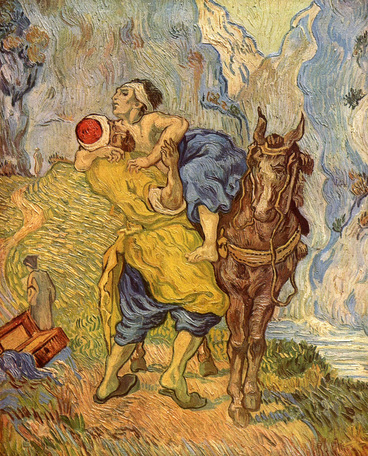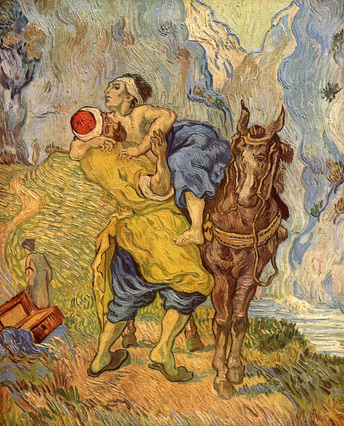|
Mercy 2.0 Mercy is not as old-fashioned as this term sounds. It is a great quality if we want to be constructive and refrain from participating in any blame game - be it local or global. In 21st century usage "social skills" or "empathy" are more frequent terms, but the wisdom of time-tested concepts is deeper, I think. Mercy is not just a skill, which facilitates interaction with others. Mercy is the real thing, it is an astonishing virtue. It is linked to humanity, compassion, and forgiveness. Mercy enables us to perceive the authenticity of life itself; it is a warm, generous approach to things and people. Mercy is happy with benevolence, and benevolence alone. Mercy is so powerful because it flows directly from Love, God, itself, the source of every constructive and healing thought and act. The #1 parable for mercy is the good Samaritan as told by Jesus and as recorded in the Bible. He relates this parable to drive home a point, to answer a question posed by a lawyer – therefore by someone whose daily profession has to do with justice, with separating right from wrong. The lawyer had asked what he needed to do in order to inherit eternal life. Jesus, having referred him to the law, receives this answer: "Thou shalt love the Lord thy God with all thy heart, and with all thy soul, and with all thy strength, and with all thy mind; and thy neighbor as thyself." Jesus' reply is straightforward and clear: "Thou hast answered right: this do, and thou shalt live." What Jesus does in answering the question, which our neighbors are, is to shift the lawyer’s thought away from justice towards mercy. Mercy doesn’t care about the right or wrong – mercy just is. The Samaritan, we learn, doesn’t ask whether the victim provoked the thieves, wore something strange or shocking or did anything offensive so as to deserve being beaten up. The Samaritan doesn’t check whether the victim is part of his own tribe or a stranger. The Samaritan sees the need and acts. He is caring in an unselfed way for his fellow-man, while others ignore his desperation and needs. The Samaritan helps and supports the healing of the crime victim - before continuing his own journey and continuing to care for his fellow-man even while pursuing his own route. The parable seems to suggest that the Samaritan is so engaged with unselfed care for his neighbor, that the love for God and man are realized and lived as a law. He is too busy to weigh the options, he lives the law. Vincent Van Gogh rendered this parable beautifully - in bold colors.
As there is always a path, an open, free path for individuals and society, I truly feel that the blame game will not stand the test of time and will never enable us to be authentic. Authenticity is linked to truth, and to truth only – while the blame game moves away from everything that is self-reflective and shifts the attention towards individual guilt and shortcomings. It makes evil real and displaces the problem into the camp of the victims, away from everyone else. As if the problem of evil were solved by debating possible causes. The Bible would have called this penalizing attitude “scribal”, I guess. It leaves victims and perpetrators alone, which shouldn’t be. And mercy knows the path to a different approach.
As a result of listening, I recalled something I did read sometime ago in an editorial, never forgetting its main message. I looked it up and found it: “It's important to distinguish between the diligent rectification of misdeeds and the mere casting of blame. When mistakes or scandals surface, are we, as direct participants or concerned onlookers, seeking to be healers or dividers? Making a reality of evil and then pinning its label on another is not productive — and not what Christianity teaches. The rush to blame, litigate, prosecute, judge, and condemn may only indicate a mean-spirited anger operating below the surface of society, a turmoil of self-interest and sensationalism that points toward what really needs attention. [...]. Jesus was never patient with wrongdoing. But neither did he blame people. He condemned the wrong, but not the wrongdoer.” (The Christian Science Sentinel, November 6, 2006) The very best asset we all have is our ability to think, to use spiritual intuition, and to never forget that we move forward in our own lives only if we see the link between our lives and the lives of others. Mary Baker Eddy mentioned in an address for an audience in Chicago, the end of the 19th century: “I will gain a balance on the side of good, my true being. This alone gives me the forces of God wherewith to overcome all error.“ In a way this could be called „Mercy 2.0“ – a possibility to tip the balance for the side of good, globally. We can and are big enough. Comments are closed.
|
Who is writing?
In my work as Christian Science practitioner and writer I draw on listening to God and listening to people. Categories
All
My Archive
October 2023
|





